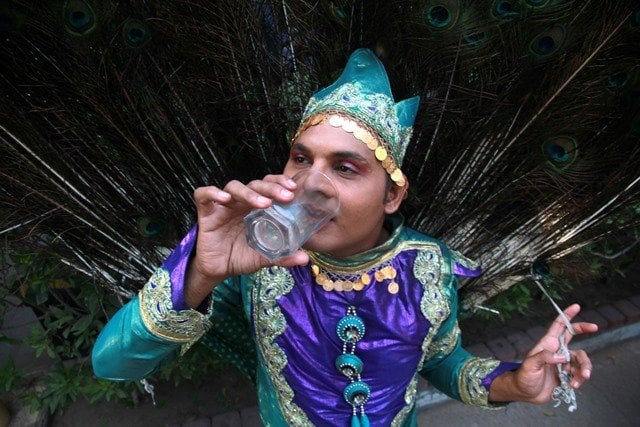Shazia Khushk sings for clean water
Folksinger speaks out against pollution of the Indus River

PHOTO: ATHAR KHAN/EXPRESS
After enthralling her captive audience with rendition of tradition Sindhi folk songs, she addressed the media and spoke about water contamination and its impact on World Water Day. “The Indus River, which was once a sweet water river, has now been turned into a gutter water stream,” she lamented, adding that people living in towns and cities along the river dispose of their waste in it. “Not only household waste, but poisonous effluent of factories and industries is also being released into Sindhu Darya [Indus River],” she added.
Shazia, who was flanked by her husband, Professor Ibrahim Khushk, referred to chemical factories set up in Sukkur, Rohri, Hyderabad and Kotri and said, “These factories release their untreated effluent into the river, which is a source of drinking water for people,” she explained, adding that if the situation continues for another 10 years, the river will be completely contaminated.
Residents of Sindh have nothing to celebrate on World Water Day
She criticised the successive governments, especially bureaucrats and politicians, for their lukewarm response to this important issue and appealed to people of different ethnic backgrounds, castes and creeds to join hands and stand up against water contamination. “It is a slow poison and people have no idea how severely polluted water damages their health,” said Shazia, adding that Manchar Lake, South Asia’s largest freshwater lake located near Sehwan, has been polluted and the same situation persists at Hamal Lake, the second largest lake in Kamber-Shahdadkot district, which has lost its population of animals and fish because of poisonous water being released from the Right Bank Outfall Drain.
Appealing to the quarters concerned, the folksinger suggested that murder cases be registered against officials found negligent in resolving this issue. “Not a single city or town of Sindh is spared from this menace. More than 80% of underground water in the province is not fit for human consumption, but poor people are compelled to drink it,” she lamented.
“All political parties must incorporate the issue of clean drinking water in their election manifestos and mount pressure on government authorities to provide potable water to the masses, coupled with proper sanitation facilities,” Shazia concluded.



















COMMENTS
Comments are moderated and generally will be posted if they are on-topic and not abusive.
For more information, please see our Comments FAQ